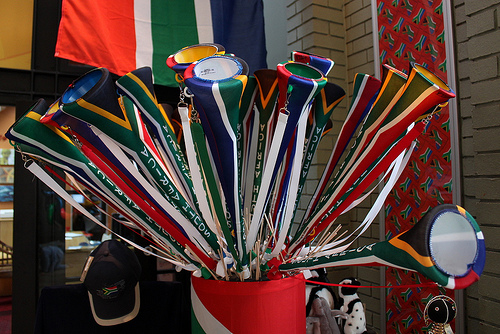
Flickr user <a href="http://www.flickr.com/photos/islandchic/4703275213/">Island Chic</a>
When vuvuzelas, those slender, ubiquitous, South African plastic trumpets took over the airwaves last week with the kickoff of the World Cup they quite literally began to annoy an entire planet. Luckily we humans are an industrious lot: When the world complains, entrepreneurs listen. Now broadcasters can buy, for example, buzz-cancelling technology from Tennessee, “a combination of dynamic broadband noise suppression and notch filtering are utilized to create the Vuvuzela noise reduction processing chain,” for $2,900. This type of filtering basically works to remove the low frequency drone, (they buzz in B-flat, apparently) from the broadcast. And, for the fans, there’s the “anti-vuvuzela filter” for roundabout $5 per half of play. The filter is the brainchild of 29-year-old Clemence Schlieweis, a German engineer with time and sound-mixing apparati on his hands. Using a different method, the filter creates an “inverse” sound wave with the same amplitude as the vuvuzela sound, but with the peaks and troughs of the wave reversed. Take a mountain, add a valley, create a level pitch.
In theory these techy methods work, so long as the vuvuzelas are uniform in sound and pitch, but with hundreds of thousands blaring at once the cacophony might be hard to match in real time. A professor of acoustics tells the UK Telegraph: “My advice is to football fans is to be Zen about it; accept vuvuzelas as part of the World Cup soundscape and pour another beer.”
Still, if you want to try a free app and you have a Mac check out VuvuX, and you can follow the latest in filtering apps at vuvuzelafiltering.com.






